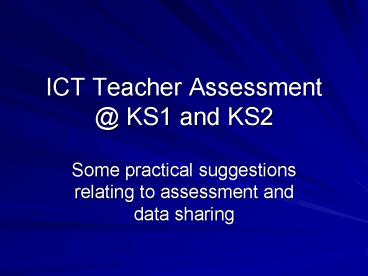ICT Teacher Assessment KS1 and KS2 - PowerPoint PPT Presentation
1 / 14
Title:
ICT Teacher Assessment KS1 and KS2
Description:
Include assessment opportunities in the lesson plans ... Summer. Spring. Autumn. What evidence to collect? For each assessed activity find: ... – PowerPoint PPT presentation
Number of Views:99
Avg rating:3.0/5.0
Title: ICT Teacher Assessment KS1 and KS2
1
ICT Teacher Assessment_at_ KS1 and KS2
- Some practical suggestionsrelating to assessment
and data sharing
2
Strategies
- Create a portfolio which includes
- samples of work from each unit
- photographs of displays
- notes about the context of the work samples
- Moderation staff meeting
- Set targets for each year group
- Use pupil tracking sheets and encourage self
evaluation - Establish a record keeping system
- Include assessment opportunities in the lesson
plans
3
What would constitute good practice in assessment
and recording?
- work in ICT should be underpinned by the National
Curriculum - objectives must be made clear to pupils
- assessment requirements should be known and
carried out by all staff - assessment must be evidence-based
- a school portfolio of pupils' work should be
available to all staff for reference - pupils should be given feedback to let them know
how they are doing - assessment outcomes should be used to inform
future planning - moderation of pupils' work internally and
externally. - assessment should be built in to your scheme of
work
4
It is best to
- print-out pupils' work and date it
- build a portfolio to show pupils' work for each
year - date it, level it and provide the context - include examples from across the curriculum
- provide displays of pupils' work in the computer
rooms - include several stages in the completion of some
work.
5
http//www.ncaction.org.uk/subjects/ict/levels.htm
Needs a Broadband Connection
6
Making your judgement
- You will arrive at judgements by taking into
account strengths and weaknesses in performance
across a range of contexts and over a period of
time, rather than focusing on a single piece of
work. - A single piece of work will not cover all the
expectations set out in a level description. It
will probably provide partial evidence of
attainment in one or two aspects of a level
description. If you look at it alongside other
pieces of work covering a range of contexts you
will be able to make a judgement about which
level best fits a pupil's overall performance.
7
Recording
- You will want to be able to explain why you have
awarded particular levels to pupils at the end of
the key stage. However, there is no requirement
for judgements to be explained in detail for each
individual or to be supported by detailed
collections of evidence for each pupil. - Decisions about collecting information, about its
purpose and how it should be used are matters for
teachers working within an agreed school policy.
8
What would constitute good practice in assessment
and recording?
- work in ICT should be underpinned by the National
Curriculum - objectives must be made clear to pupils
- assessment requirements should be known and
carried out by all staff - assessment must be evidence-based
- a school portfolio of pupils' work should be
available to all staff for reference - pupils should be given feedback to let them know
how they are doing - assessment outcomes should be used to inform
future planning - moderation of pupils' work internally and
externally. - assessment should be built in to your scheme of
work
9
An Assessment Model
- 4 themes
- Finding things out
- Developing ideas and making things happen
- Exchanging and sharing information
- Reviewing modifying and evaluating
- Each assessable activity must provide scope to
make a judgement on these
10
4 strands of the QCA curriculum
- Communicating Information
- Data Handling
- Modelling
- Control, Sensing and Monitoring
11
One Model
12
One Model
13
What evidence to collect?
- For each assessed activity find
- A piece of work which solidly represents the
expected level. Fully annotated. - A piece of work above this level
- A piece of work below this level
- Now benchmark all other pieces of work from the
class in a tick list - 4 assessments will therefore generate 12 pieces
of work. - After 2 years this will constitute a levelled
portfolio.
14
Data Sharing
- SIMS Assessment Manager
- Use of Aspects to report levels
- Integration with existing IMS data collection
process and timetable - End of Key Stage only
- Timetable































